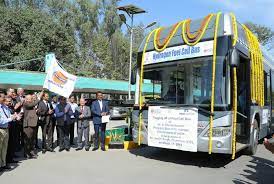India’s First Hydrogen Fuel Cell (HFC) Bus:

The Union Minister of State of Science & Technology launched India’s first Hydrogen Fuel Cell (HFC) Bus.
- A hydrogen fuel cell is an electrochemical device that converts hydrogen into electrical energy.
- Fuel cells work in a similar manner to conventional batteries found in electric vehicles, but they do not run out of charge and don’t need to be recharged with electricity.
- They continue to produce electricity as long as there is a supply of hydrogen.
- One of the most successful fuel cells uses the reaction of hydrogen with oxygen to form water.
- They produce no tailpipe emissions (emission of gaseous and particulate pollutants) and only emit water vapour and warm air.
- They are more efficient than internal combustion engine vehicles.
- Hydrogen FCEVs have an advantage over battery powered EVs in terms of refuelling time, hydrogen can be refilled in a fuel cell vehicle in a matter of minutes, nearly as fast as an internal combustion engine can be refilled with fossil fuels.
- The HFC bus has been developed by the Council of Scientific & Industrial Research (CSIR) and KPIT, an Indian Multinational Corporation.
- The launch of this India’s first truly indigenously developed HFC Bus is in tune with the National Hydrogen Energy Mission.
- The fuel cell utilizes Hydrogen and Air to generate electricity to power the bus and the only effluent from the bus is water.
- Thus, making it possibly the most environmentally friendly mode of transportation.
- The high efficiency of fuel cell vehicles ensures lower operational costs per kilometre than diesel powered vehicles and can bring freight revolution in India.




